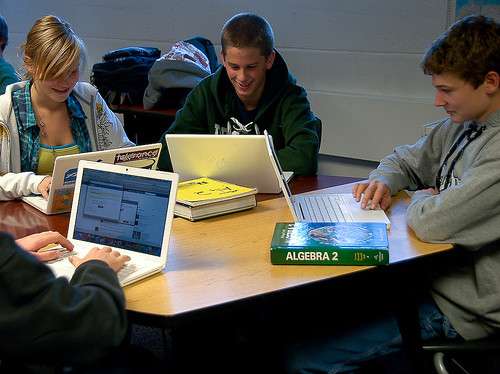Writing on
edSocialMedia's blog,
Montclair Kimberley Academy's Director of Technology Bill Stites considers a phenomenon every high school is addressing: student use and misuse of Facebook and other social media.

For all of the miraculous benefits of technology to the educational process, the allure of social networking at the expense of schoolwork is a novel, threatening reality. Stites's post was triggered by an article in the Coshocton
Tribune entitled "Schools left in the dust on social media highway" describing efforts to block access to Facebook, Myspace and Twitter at some central Ohio schools.

One reader comments: "As a parent who works in IT and consults with various secondary schools around the country, I feel that it is important that other parents understand one basic fact. There is no software, no amount of money that can be spent that will keep kids off of social media sites. You might be able to slow the process down, but you will never stop it." Stites agrees, noting, "Technology is ahead of laws and ethics... the world of technology is changing quicker than we can keep up."

He goes on: "We cannot enter into an arms race with students, blocking web sites doesn’t work. There are numerous proxy sites available, new sites like Chatroulette are popping up every day which slip through content filters. As more and more students have Internet enabled mobile devices, students can simply bypass any network protocols put in place because quite simply there’s an 'App for that!'" The responses that schools make to new realities are as diverse as those schools. Imagine the loss of of control experienced by prep schools (including at least one in New Hampshire) where all Internet access is supposedly managed!

One of my first educational mentors used to advise: "Never try to control behavior you cannot control!" And, in fact, Proctor is a school that is distinguished, in part, by responsibilities granted students--within clear limits.
At present, our policy denies social media use from 8:00-10:00 PM on weeknights.

No one--not even those of us who champion "freedom within fences"--can ignore the threat to optimal learning posed by a laissez-faire approach. Adolescents bring highly diverse levels of self-discipline. The challenge, Stites argues, is for us to
teach "digital citizenship": responsible uses of technology. "Take time in your homerooms, advisor periods, and school assemblies or in any venue that is appropriate to discuss these issues and topics. We need to understand that this is the world that our students live and as educators we need to help guide them through it and help them understand the choices that they make, good or bad."

This is a fast-evolving responsibility that falls on the adult community with substantial gravity!



























